Growing up and working in Luxembourg, Fred Jaeger has always been involved in timber, and all things forestry related. He worked in the family’s sawmill business for many years, but moved to Boyle in Co Roscommon in 2007.
“Ireland is about 27 times bigger than Luxembourg. Luxembourg is a very small country and it has a population of 640,000. It’s densely populated. My family’s sawmill was just 7km from the city centre. After working in the business for many years, it became clear that planning limitations, little to no option to expand and major traffic congestion was hampering the future of the business.
“From here, I made the decision to leave the business and I went to work for a Luxembourg farming co-operative, where I headed up the home deliveries of frozen food and fresh food departments. My father continued to run the sawmill for several more years. My wife and I had regularly been to Ireland on holidays and we were fond of it here. One day, we stumbled across a house advertised for sale in Ireland online and we decided to move to Ireland,” explained Fred.
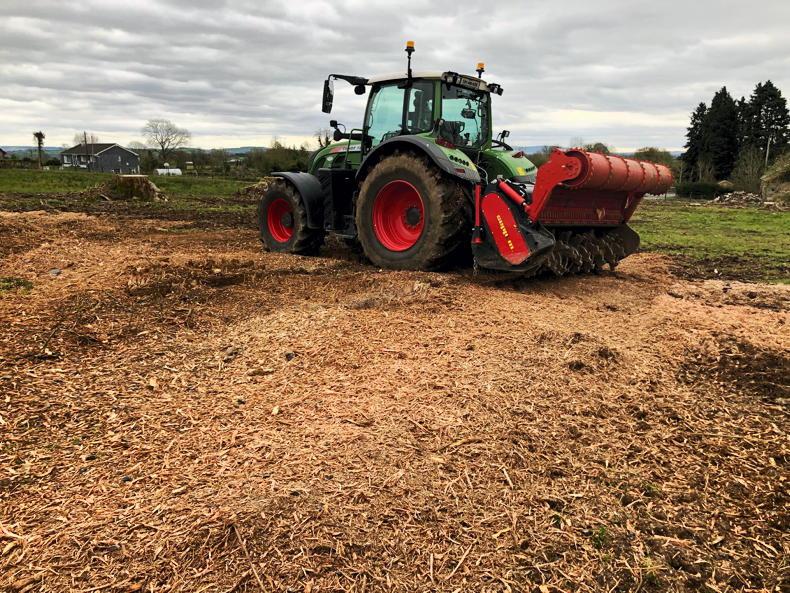
After- Fred uses a Seppi Star Soil on his Fendt 724 to crush stones and mulch wood, while tilling the soil to a depth of 40cm.
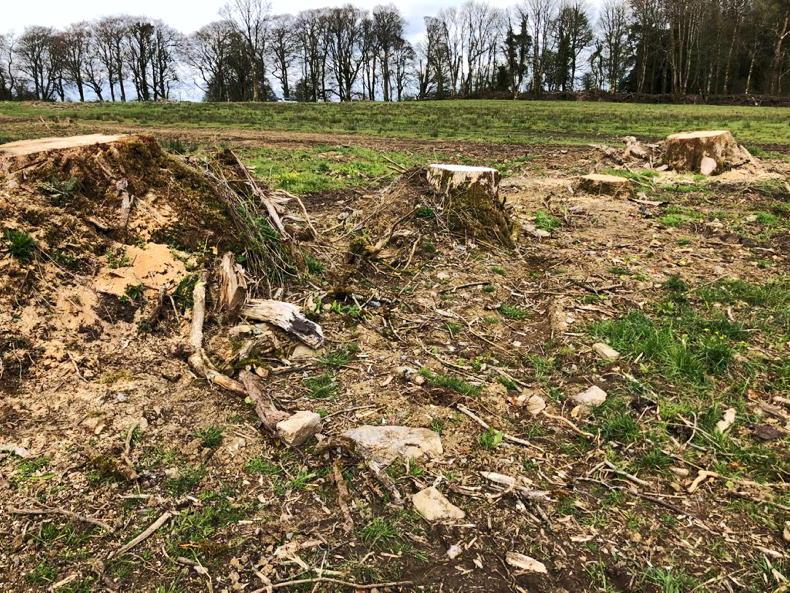
Before- large tree stumps
Mulching
Upon arrival, he purchased a topper to cut the rushes on his newly acquired holding. However, he wasn’t able to keep new shear bolts on the machine and soon learnt how dense the vegetation in rural Ireland really was. A used mulcher followed, but rotor trouble led to Fred buying a new Ryetec mulcher.
His attention to detail soon caught the eye of neighbours, who subsequently asked him to carry out some work for them. Increased demand for the service locally meant Fred upgraded to a front- and rear-mounted mulcher setup. Upon upgrading once again, Fred had come across the Italian-built Seppi equipment and was impressed with its build quality. High demand for the service in the area led Fred to do a deal with Green Equipment Services in Wexford where he subsequently purchased a new Seppi WBS 2.5m machine.
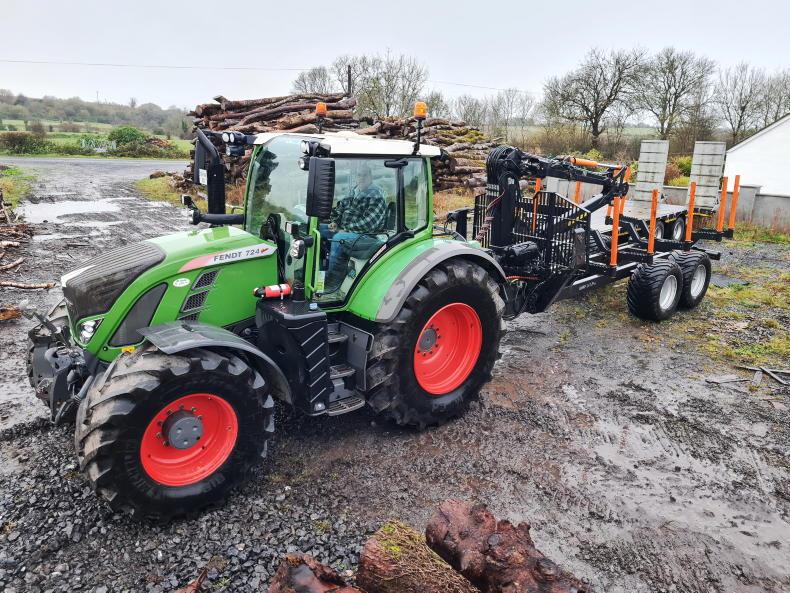
Fred runs two Fendt 724s, with this one coupled to a recently purchased Estonian manufactured 14t BMF forestry trailer.
Seppi Star Soil
In 2013, Fred went down the route of buying a Seppi Midi Forest, a mid-range forestry mulcher. Limited to mulching timber with a 25cm diameter, Fred decided to upgrade the unit two years later for a new, larger Seppi Star Soil, the first one in the country.
A much superior machine, the Star Soil is designed to crush stones with a diameter of up to 30cm, mulch wood with a diameter of up to 40cm and till the soil to a depth of 40cm. The soil and forestry tiller is designed for tractors between 180hp and 310hp.
“I find that you have to work the soil to at least six to eight inches deep to leave a good finish, and open the soil for drainage. I usually run it at 1,900rpm on my Fendt 724 at a forward speed between 0.6-0.8km/h. Fuel consumption all depends on the depth you work at and the material and density of what you’re mulching/crushing. I’ve seen it range from 30l/h up to 50l/h”.
“A lot of my work is going into forestry land that was just clearfelled and stump grinding and mulching the roots. One pass will also till the soil and leave it ready for grass seed. I also do clearance for roads, general site clearance and crush fields which may be stony, but are not subjected to complete sheets of bedrock. I was asked by one local farmer to rework a field that had been ploughed, where the contractor ploughed the field too deep and brought up dauby-type soil. I worked the soil to eight to 10 inches deep and attempted to reverse the ploughing process, by returning the topsoil to the top of the ground once again.
“Output capacity all depends on the job in hand. On a soil tilling and stone crushing job, it would take three to three-and-a-half hours per acre to do a clean job. The same for a clearfell, plus additional time for dealing with stumps above ground, which will then depend on how high they are left and whether it is softwood or hardwood, and of course the diameter of the stumps,” explained Fred.
The heavy-duty mulcher features a two-speed system. Depending on the spec, the speed is changed manually or from the cab, producing a reduction from approximately 1,500rpm to 500rpm, maintaining a constant 1,000 speed of the PTO of the tractor. This allows for a higher torque and better processing so the Star Soil can work as a hybrid-type machine, mulching wood in the fast gear and crushing stone and soil in the slow gear.
The lateral gear transmission and the main gearbox feature an integrated cooling system. The cooling function can be activated from the cab using the control device and the temperature can be monitored constantly through the display. This eliminates the risk of the transmission overheating. The machines come with Isobus as an optional extra, allowing some functions to be monitored and controlled directly by the on-board computer in the tractor.
Due to the nature of the work, much of the unit is manufactured using replaceable anti-wear plates made of Hardox, while the points most subject to wear are designed from tungsten carbide.

Fred owns the only self-propelled Fecon mulching tractor in the country, which is also one of a handful in Europe.
Tractors
When Fred moved to Ireland, he brought a Ford 6610 with him from Luxembourg. Needing a bit more power for a mulcher, he later upgraded the machine to a 100hp Fiat. As the demand for his services grew, a demonstration Deutz-Fahr 190 TTV was imported from Luxembourg, while a new Deutz-Fahr 7250 TTV Warrior was purchased soon after.
Fred explained that he liked the tractors, but he opted to move to Fendt as he felt they were a more versatile tractor which would be more suitable for his type of forestry related work. He made the jump to a new Fendt 724 in 2018, followed by the purchase of a second new 724 in 2019. He explained that he is more than happy with the capability and reliability of the Fendt tractors, and the backup from McHale Farm Machinery.
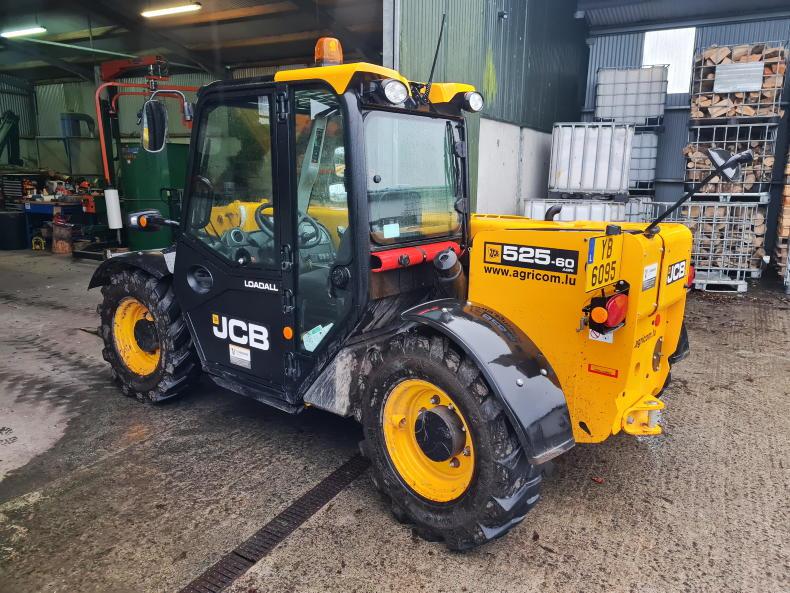
This JCB 525-60 mini telehandler is used to load logs onto the firewood processing deck table.
Other forestry equipment
Fred owns the only self-propelled Fecon mulching tractor in the country, which is also one of a handful in Europe. The 150hp tracked unit is designed for vegetation management and lot clearing jobs. Its ability to work in poor ground conditions where a tractor might fail led Fred to taking the plunge on the machine.
To tie in with his firewood kindling business, in recent years Fred has begun to take timber as part payment for jobs.

The trailer is 6,680mm (22ft) long and 2435mm (8ft) wide, while the side rails can be extended by a further 600mm.
A key element to this was transporting the timber from the job in hand to his yard. To help with this, a new Austrian-built Binderberger forestry trailer was purchased. Not overly happy with its stability when loading, he soon upgraded it for an Estonian-made BMF14T2Pro purchased from M-Large in Belfast.
This two-beam forestry trailer has a capacity of up to 14t. The trailer is manufactured using Strenx steel, a steel essentially designed to be strong yet light. The trailer features a turning drawbar that is home to a securely protected oil pump.
The trailer is 6,680mm (22ft) long and 2435mm (8ft) wide, while the side rails can be extended by a further 600mm. Fred liked that the company built its own crane and opted for the 7.5m reach unit. Its design sees the hydraulic lines routed inside the crane boom, protected and out of harm’s way. The crane is remotely controlled, using a wireless controller.
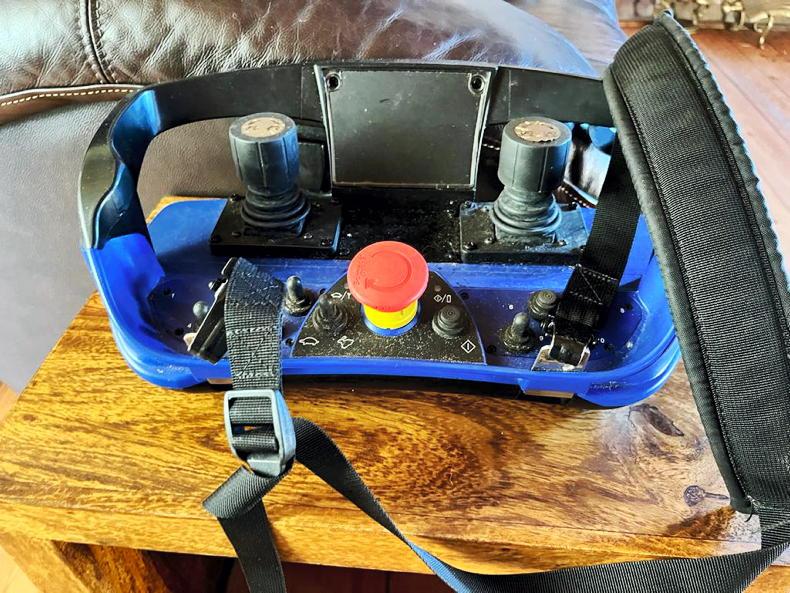
The crane on the BMF forestry trailer is remotely controlled, using a wireless controller.
Over the years, Fred also bought himself a Hitachi 120 12t excavator. Alongside some excavation works, the unit spends most of its time coupled to a BMSL 4ft mulcher head, designed to handle timber with a diameter of up to eight inches.
A Spearhead TW66 was purchased new in 2016. This is primarily used for maintaining hedgerows on Fred’s own farm, but he also does a week’s work on hire for some neighbours. 
Fred’s Posch (Austrian built) firewood processing setup which complete cost over €80,000.
Kindling and firewood business
Once settled in Ireland, Fred had seen the debates about banning the cutting of turf and felt that an alternative source of fuel would stand up as a sustainable business idea. Well used to handling timber from his days in Luxembourg, Fred set up an Austrian-built Posch firewood processing unit.
At the beginning, logs are loaded on to the processing deck table using Fred’s JCB 525-60 mini telehandler. This is a 3.2m long, two-metre table with a cross-conveyor. The fully automated hydraulically powered metal chains run the length of the table and feed individual lengths of timber into the firewood processor for cutting.
The firewood processor splits the logs into two, eight or 12 billets per work cycle and is joystick controlled. The split timber is screened, with the smaller bits and debris being collected in tonne bags, while the perfectly split logs are fed into a large barrel. Once the barrel is full, a power-assisted net wrapping procedure will engage, wrapping the logs securely. The logs are then fixed to a wooden pallet base.
The system is designed for the drying, storage and transportation of firewood logs. The logs are then delivered to Fred’s customers, most of whom are private users, via a jeep and trailer.
He also runs a kindling machine which processes softwood logs into fine kindling and bags it. The entire firewood processing unit is electronically powered via 400v (three-phase), which is powered by a diesel generator.
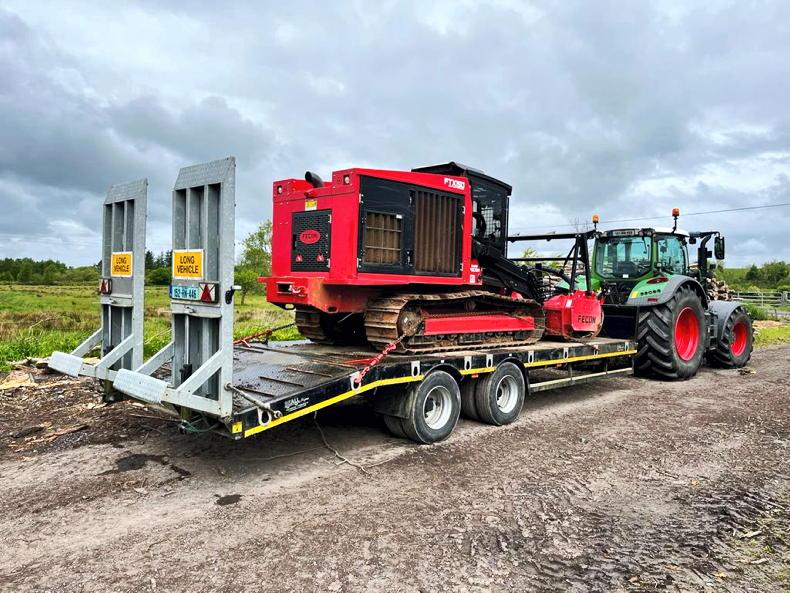
The 150hp tracked unit is designed to work in poor ground conditions where a tractor might fail.
Model: Seppi Star Soil.
Working width: 250cm (98in).
Overall width: 280cm (110in).
Working speed: 0-2km/h.
Horsepower: up to 310hp.
Gearbox: two-speed.
Weight with roller: 4,050kg.
Cost of replacement hammers: €9,200 plus VAT.
Starting price: €112,000 plus VAT.
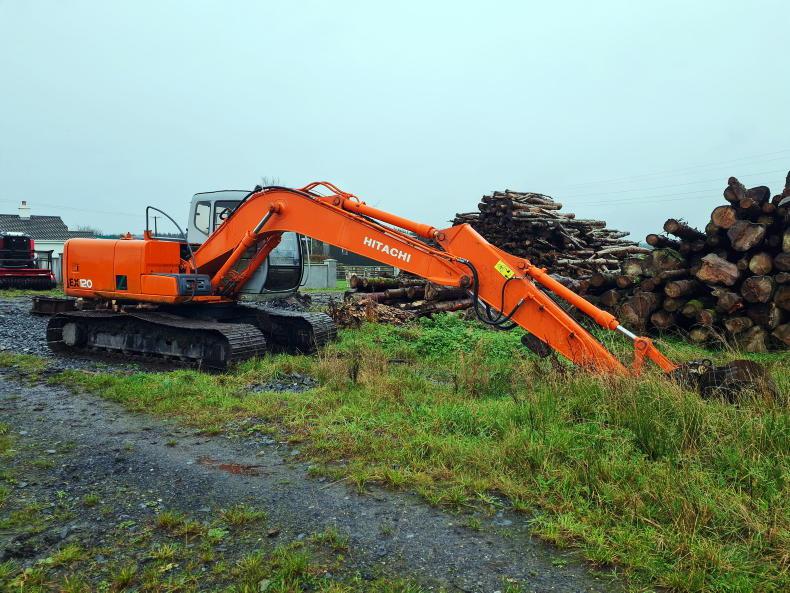
Fred also runs a Hitachi 120, 12t excavator which spends most of its time coupled to a BMSL 4ft mulcher head, designed to handle timber with a diameter of up to eight inches.
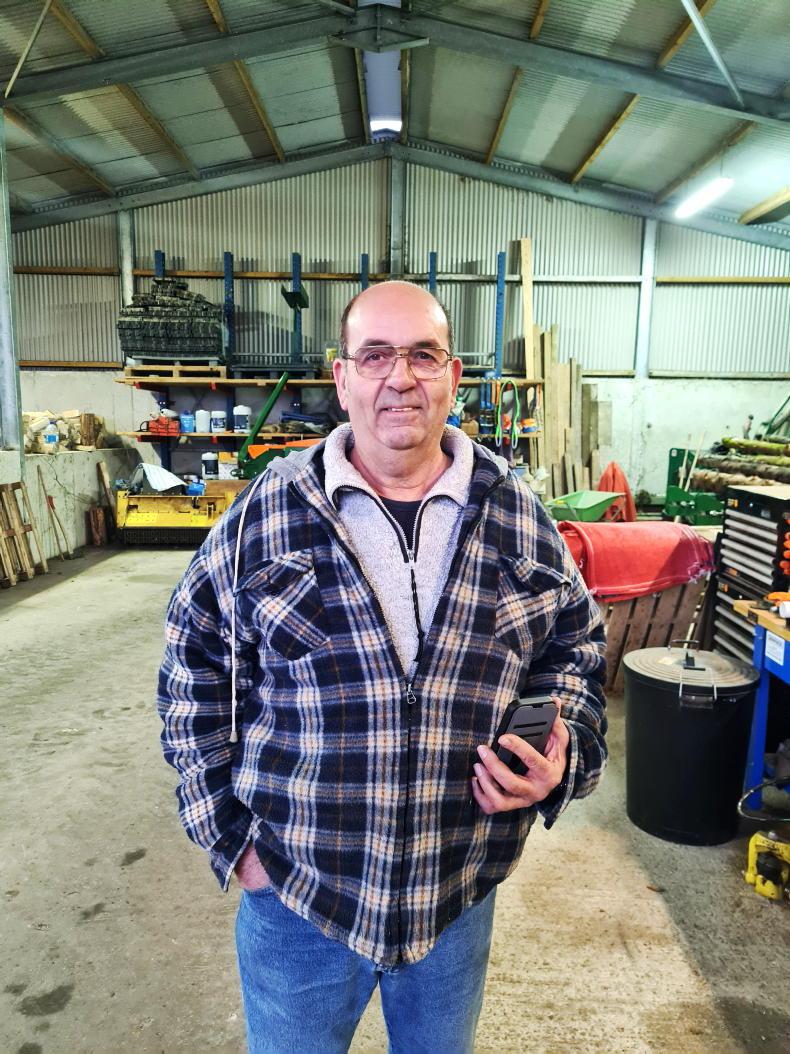
Fred Jaeger
Growing up and working in Luxembourg, Fred Jaeger has always been involved in timber, and all things forestry related. He worked in the family’s sawmill business for many years, but moved to Boyle in Co Roscommon in 2007.
“Ireland is about 27 times bigger than Luxembourg. Luxembourg is a very small country and it has a population of 640,000. It’s densely populated. My family’s sawmill was just 7km from the city centre. After working in the business for many years, it became clear that planning limitations, little to no option to expand and major traffic congestion was hampering the future of the business.
“From here, I made the decision to leave the business and I went to work for a Luxembourg farming co-operative, where I headed up the home deliveries of frozen food and fresh food departments. My father continued to run the sawmill for several more years. My wife and I had regularly been to Ireland on holidays and we were fond of it here. One day, we stumbled across a house advertised for sale in Ireland online and we decided to move to Ireland,” explained Fred.

After- Fred uses a Seppi Star Soil on his Fendt 724 to crush stones and mulch wood, while tilling the soil to a depth of 40cm.

Before- large tree stumps
Mulching
Upon arrival, he purchased a topper to cut the rushes on his newly acquired holding. However, he wasn’t able to keep new shear bolts on the machine and soon learnt how dense the vegetation in rural Ireland really was. A used mulcher followed, but rotor trouble led to Fred buying a new Ryetec mulcher.
His attention to detail soon caught the eye of neighbours, who subsequently asked him to carry out some work for them. Increased demand for the service locally meant Fred upgraded to a front- and rear-mounted mulcher setup. Upon upgrading once again, Fred had come across the Italian-built Seppi equipment and was impressed with its build quality. High demand for the service in the area led Fred to do a deal with Green Equipment Services in Wexford where he subsequently purchased a new Seppi WBS 2.5m machine.

Fred runs two Fendt 724s, with this one coupled to a recently purchased Estonian manufactured 14t BMF forestry trailer.
Seppi Star Soil
In 2013, Fred went down the route of buying a Seppi Midi Forest, a mid-range forestry mulcher. Limited to mulching timber with a 25cm diameter, Fred decided to upgrade the unit two years later for a new, larger Seppi Star Soil, the first one in the country.
A much superior machine, the Star Soil is designed to crush stones with a diameter of up to 30cm, mulch wood with a diameter of up to 40cm and till the soil to a depth of 40cm. The soil and forestry tiller is designed for tractors between 180hp and 310hp.
“I find that you have to work the soil to at least six to eight inches deep to leave a good finish, and open the soil for drainage. I usually run it at 1,900rpm on my Fendt 724 at a forward speed between 0.6-0.8km/h. Fuel consumption all depends on the depth you work at and the material and density of what you’re mulching/crushing. I’ve seen it range from 30l/h up to 50l/h”.
“A lot of my work is going into forestry land that was just clearfelled and stump grinding and mulching the roots. One pass will also till the soil and leave it ready for grass seed. I also do clearance for roads, general site clearance and crush fields which may be stony, but are not subjected to complete sheets of bedrock. I was asked by one local farmer to rework a field that had been ploughed, where the contractor ploughed the field too deep and brought up dauby-type soil. I worked the soil to eight to 10 inches deep and attempted to reverse the ploughing process, by returning the topsoil to the top of the ground once again.
“Output capacity all depends on the job in hand. On a soil tilling and stone crushing job, it would take three to three-and-a-half hours per acre to do a clean job. The same for a clearfell, plus additional time for dealing with stumps above ground, which will then depend on how high they are left and whether it is softwood or hardwood, and of course the diameter of the stumps,” explained Fred.
The heavy-duty mulcher features a two-speed system. Depending on the spec, the speed is changed manually or from the cab, producing a reduction from approximately 1,500rpm to 500rpm, maintaining a constant 1,000 speed of the PTO of the tractor. This allows for a higher torque and better processing so the Star Soil can work as a hybrid-type machine, mulching wood in the fast gear and crushing stone and soil in the slow gear.
The lateral gear transmission and the main gearbox feature an integrated cooling system. The cooling function can be activated from the cab using the control device and the temperature can be monitored constantly through the display. This eliminates the risk of the transmission overheating. The machines come with Isobus as an optional extra, allowing some functions to be monitored and controlled directly by the on-board computer in the tractor.
Due to the nature of the work, much of the unit is manufactured using replaceable anti-wear plates made of Hardox, while the points most subject to wear are designed from tungsten carbide.

Fred owns the only self-propelled Fecon mulching tractor in the country, which is also one of a handful in Europe.
Tractors
When Fred moved to Ireland, he brought a Ford 6610 with him from Luxembourg. Needing a bit more power for a mulcher, he later upgraded the machine to a 100hp Fiat. As the demand for his services grew, a demonstration Deutz-Fahr 190 TTV was imported from Luxembourg, while a new Deutz-Fahr 7250 TTV Warrior was purchased soon after.
Fred explained that he liked the tractors, but he opted to move to Fendt as he felt they were a more versatile tractor which would be more suitable for his type of forestry related work. He made the jump to a new Fendt 724 in 2018, followed by the purchase of a second new 724 in 2019. He explained that he is more than happy with the capability and reliability of the Fendt tractors, and the backup from McHale Farm Machinery.

This JCB 525-60 mini telehandler is used to load logs onto the firewood processing deck table.
Other forestry equipment
Fred owns the only self-propelled Fecon mulching tractor in the country, which is also one of a handful in Europe. The 150hp tracked unit is designed for vegetation management and lot clearing jobs. Its ability to work in poor ground conditions where a tractor might fail led Fred to taking the plunge on the machine.
To tie in with his firewood kindling business, in recent years Fred has begun to take timber as part payment for jobs.

The trailer is 6,680mm (22ft) long and 2435mm (8ft) wide, while the side rails can be extended by a further 600mm.
A key element to this was transporting the timber from the job in hand to his yard. To help with this, a new Austrian-built Binderberger forestry trailer was purchased. Not overly happy with its stability when loading, he soon upgraded it for an Estonian-made BMF14T2Pro purchased from M-Large in Belfast.
This two-beam forestry trailer has a capacity of up to 14t. The trailer is manufactured using Strenx steel, a steel essentially designed to be strong yet light. The trailer features a turning drawbar that is home to a securely protected oil pump.
The trailer is 6,680mm (22ft) long and 2435mm (8ft) wide, while the side rails can be extended by a further 600mm. Fred liked that the company built its own crane and opted for the 7.5m reach unit. Its design sees the hydraulic lines routed inside the crane boom, protected and out of harm’s way. The crane is remotely controlled, using a wireless controller.

The crane on the BMF forestry trailer is remotely controlled, using a wireless controller.
Over the years, Fred also bought himself a Hitachi 120 12t excavator. Alongside some excavation works, the unit spends most of its time coupled to a BMSL 4ft mulcher head, designed to handle timber with a diameter of up to eight inches.
A Spearhead TW66 was purchased new in 2016. This is primarily used for maintaining hedgerows on Fred’s own farm, but he also does a week’s work on hire for some neighbours. 
Fred’s Posch (Austrian built) firewood processing setup which complete cost over €80,000.
Kindling and firewood business
Once settled in Ireland, Fred had seen the debates about banning the cutting of turf and felt that an alternative source of fuel would stand up as a sustainable business idea. Well used to handling timber from his days in Luxembourg, Fred set up an Austrian-built Posch firewood processing unit.
At the beginning, logs are loaded on to the processing deck table using Fred’s JCB 525-60 mini telehandler. This is a 3.2m long, two-metre table with a cross-conveyor. The fully automated hydraulically powered metal chains run the length of the table and feed individual lengths of timber into the firewood processor for cutting.
The firewood processor splits the logs into two, eight or 12 billets per work cycle and is joystick controlled. The split timber is screened, with the smaller bits and debris being collected in tonne bags, while the perfectly split logs are fed into a large barrel. Once the barrel is full, a power-assisted net wrapping procedure will engage, wrapping the logs securely. The logs are then fixed to a wooden pallet base.
The system is designed for the drying, storage and transportation of firewood logs. The logs are then delivered to Fred’s customers, most of whom are private users, via a jeep and trailer.
He also runs a kindling machine which processes softwood logs into fine kindling and bags it. The entire firewood processing unit is electronically powered via 400v (three-phase), which is powered by a diesel generator.

The 150hp tracked unit is designed to work in poor ground conditions where a tractor might fail.
Model: Seppi Star Soil.
Working width: 250cm (98in).
Overall width: 280cm (110in).
Working speed: 0-2km/h.
Horsepower: up to 310hp.
Gearbox: two-speed.
Weight with roller: 4,050kg.
Cost of replacement hammers: €9,200 plus VAT.
Starting price: €112,000 plus VAT.

Fred also runs a Hitachi 120, 12t excavator which spends most of its time coupled to a BMSL 4ft mulcher head, designed to handle timber with a diameter of up to eight inches.

Fred Jaeger

















 This is a subscriber-only article
This is a subscriber-only article









SHARING OPTIONS: